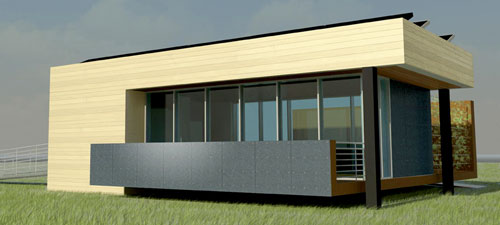Tufts Creates Solar Home for Competition
Tufts, Boston Architectural College Compete in Solar Decathlon

A rendering of the solar-powered home Tufts and BAC students will create. Photo courtesy Tufts University.
A collaborative team of student designers, engineers and planners from the Boston Architectural College and Tufts University used Earth Day as the backdrop for the unveiling of their participation in an international competition to create a solar-powered home that is both attractive and affordable.
The 800 square foot sustainable house will be built on Tufts’ campus and is a joint effort between the BAC and Tufts.  According to Tufts’ Alex Reid, the house should be completed by September. Construction on the house began a few weeks ago inside a warehouse at Tufts and has moved outside to another part of campus, where it will remain until its completion in the fall.
The Tufts/BAC group, named Team Boston, is competing against 19 other teams from the United States, Canada and Germany in the 2009 Solar Decathlon sponsored by the U.S. Department of Energy. Team Boston is the only entry from New England and was formed last winter after a rigorous selection process by the DOE, which has provided each team competing in the bi-annual event with $100,000 in grant money. Project costs will be significantly greater than the DOE grant and Team Boston is actively fundraising to makeup the difference.
Labeled as Curio House, Team Boston’s design is both innovative and affordable. The project draws upon the strengths and expertise of both institutions. Students from the BAC contribute expertise and training as designers with a focus on sustainable building concepts. Tufts’ students are able to draw on the university’s ongoing research into sustainability and green technology through the Tufts Institute of the Environment and the School of Engineering.
Solar Power and Innovation
Curio House’s technical innovations include a new way to harness energy from the sun. In conventional systems, solar energy flows from several photovoltaic panels to a single, centralized inverter that converts the DC power into usable electricity. Team Boston will attach micro-inverters to each individual panel and use them to track energy output through an Internet-based monitoring system. Micro inverters alert users to malfunctioning panels and ultimately result in a higher energy yield.
In addition to the projects being student-directed, the competition requires that the houses include sleeping quarters, entertainment space, a kitchen and a bathroom.
Solar Village in Washington, D.C.
The Decathlon is comprised of ten graded competitions in areas including design, energy usage and marketability. Following a comprehensive design process and construction phase, teams will transport the houses to the National Mall in Washington D.C., by October 1st, where the houses will be judged and open to the public for viewing. During this year’s competition, more than 250,000 people are expected to visit the solar village.
“We are addressing broader issues of excessive consumption, climate change and our relation to the built environment. We’re setting a new paradigm of how we use limited resources and showcasing the next generation of problem solving. In reality, the twenty schools aren’t in competition with one another, but with the status quo that has gotten us into this mess,” said Team Boston Project Manager and BAC student Colin Booth.
“We face significant environmental challenges in the development and construction of this project, a sustainable house that will likely return to face New England’s winters. With this project we are able to experiment, and to exercise the ideals that we expect will inform the future of sustainable design,†said Booth.
Tufts’ principal investigator for the project, William Moomaw, director of the Tufts Institute for the Environment and a professor of international environmental policy at The Fletcher School, emphasizes that the house will illustrate a convergence of social policy, engineering and sustainability. Moomaw said the design and construction of the house translates theory into real world practice. Moomaw is joined in the project by co-investigator, Chris Swan, Associate Professor of Civil Engineering at Tufts and BAC principal investigator Greg Demchak of Autodesk and a BAC faculty member.
“Sustainable living is the future but it’s not a very practical goal if the related costs are so enormous that they’re not accessible to a wider community of average homebuyers. Building this house can’t but help further our practical understanding of sustainability and renewable energy. What better education experience than to plan, design and build a house?” Said Moomaw.
More…
The official Tufts/BAC Curio House website
Information and photo courtesy Tufts University.